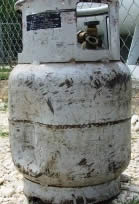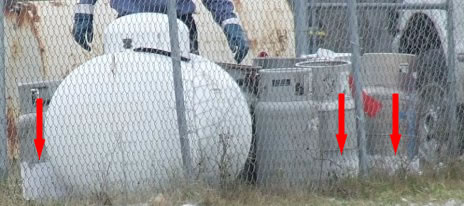
- Frequently Asked Questions - Home
- First Time Propane User
- Propane Tank Color
- Leak Test
- Abnormal Usage and Leaks
- Gallons Lost in LP Gas Leaks
- Checking For Gas Leaks
- Propane Do It Yourself
- Propane Tank Leak
- Exploding Propane Tanks
- Propane Cylinder Explosions
- Valve Open - No Propane
- Propane Tank Disposal
- Propane Regulator Freezing
- Propane BTU Content
- Propane Emergencies
Propane Cylinder Explosions - How Safe Are Bottles?
Like ASME propane tanks, LP Gas cylinders do not explode easily and nor do they explode on their own. The requirements for a cylinder to "explode" or experience failure is related to heat in the same manner that heat affects the failure of an ASME propane tank. The principle is the same but because the container sizes are so different, the situations are often different as well. In short, propane cylinders will not explode when they are used and stored in accordance with NFPA requirements.
Propane Cylinder Strength

The integrity of a propane bottle needs to be understood before exploring the issues that can lead to a ruptured container. This is extremely important to understood because the likelihood of a cylinder explosion is exponentially remote even if cylinders are extremely damaged by forceful blows to the container shell. By design, all propane gas containers are manufactured to withstand extensive external damage. Although the integrity of a cylinder may be compromised due to forceful impact, the containment of liquid propane is secured, which is factored into the engineering and construction of these cylinders. The picture to the left is a 5 gallon steel buffer cylinder that fell onto a highway and was struck by a vehicle. The damage to the vehicle was by far more extensive than the damage to the propane bottle. Although this cylinder is no longer fit for continued service, the structural strength of the container is depicted in this picture. In short, propane cylinders are designed to withstand impact without rupturing or exploding. Although this is a real world example and was not a test, attempting to duplicate this scenario would be nothing short of dangerous.
Propane Cylinder Explosions
Cylinder explosion videos can easily be found browsing the internet. A search on a video website for propane explosions will normally yield numerous results. Most all of these videos share a common theme, the propane cylinders are placed on a fire or source of extreme heat. Many of these propane cylinders explode after being shot at while on a fire (fire reduces the integrity of steel propane containers). Some videos are filmed by amateurs while others are staged and controlled explosions produced by professionals but the common catalyst for causing a propane cylinder explosion is fire and extreme heat.
A very important point about propane cylinders that are shot during flame impingement; Once the bullet penetrates the compromised propane cylinder, the gas bottle itself becomes a deadly projectile with a mind and direction of its own. Shooting at propane cylinders and tanks in this manner can result in death.
Cylinder Storage Fires and Explosions
One of the more potentially dangerous situations regarding propane cylinders revolves around their storage. The storage of propane cylinders itself isn't dangerous. The potential danger is generally introduced by irresponsible behavior and/or human error. For instance, a group of cylinders in storage cages are all secure and filled, properly positioned and legal in all respects but one of the cylinders has the bleeder valve opened slightly and is allowing a small amount of propane out of the tank. An employee is walking by the cylinder cage smoking a cigarette and leans down to inspect the hissing noise coming from the cylinder. The cigarette ignites the propane resulting in a small fire that under most circumstances would be considered manageable. However the employee panics and runs inside to call the fire department instead of using the available fire extinguisher to put the fire out. In the meantime, the original fire from the bleeder valve is directly impinging on the adjacent cylinders resulting in the opening of their relief valves and subsequent igniting of the escaping propane gas. The original fire has become the catalyst for a chain reaction of propane cylinder fires. Some of the cylinders rupture due to direct flame impingement, intense heat and over pressure. Due to human error, a once manageable (and preventable) fire has now become a damaging situation. The picture below depicts irresponsible behavior on the part of a propane company employee. This employee has opened the bleeder valves on these forklift cylinders in order to empty them. Notice the frost that has formed around the bottom of the cylinders, indicating the liquid propane level. Any source of ignition in the vicinity could result in a chain reaction as described above.
